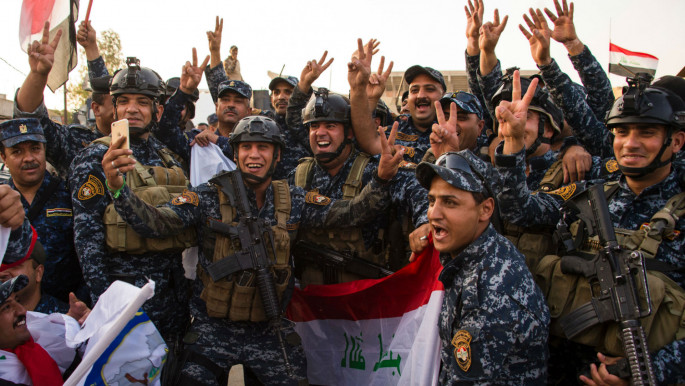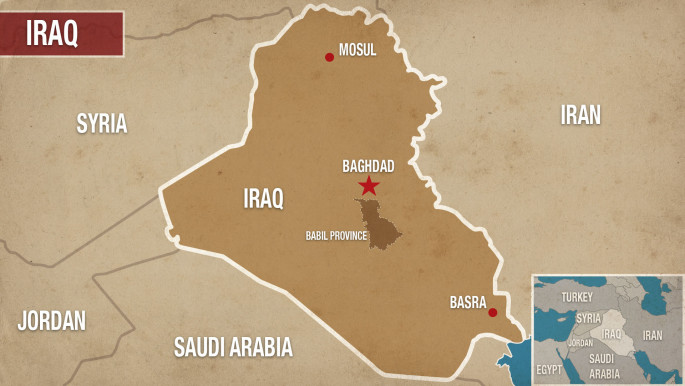
Iraq's political turmoil will ensure Islamic State's survival
Their motto, 'baqiya wa-tatmaddad', which translates to 'remaining and expanding', is likely to prove partly correct, at least in Iraq.
As their proto-state atrophies and people consign them to the dustbin of history, it's worth remembering that Islamic State has been here before, and the same conditions which allowed them to endure then, are still manifest and will not be remedied any time soon.
In 2007 the Islamic State's predecessor organisation Al-Qaeda in Iraq (AQI) had been declared defeated after the now famous Sahwa, or Sunni Awakening, which had organised various local tribes to the anti-AQI coalition.
AQI's operational capacity had been almost completely destroyed and by 2010, 34 of the top 42 leaders had been removed from the battlefield. The little support they did have disappeared due to the imposition of their puritanical version of Islam and their wanton violence towards the local communities. Such circumstances should have been the death knell for this organisation, but Iraq's political dysfunction gave the group a lifeline.
In an op-ed for Foreign Policy in 2014, then Prime Minister Nouri al-Maliki wrote, "Open, inclusive politics is an integral part of our security strategy. A society where every community has a voice and no one feels excluded will deny extremists the support they require for their violent aims."
 |
Since the downfall of the Baath regime, Iraq's Sunni community has felt disenfranchised |  |
His assessment was one of clarity, but under his stewardship quite the opposite occurred. His alienation, marginalisation and heavy handed approach towards the Sunni community - who have legitimate grievances - allowed a resurgent, and re-branded AQI to reconstitute itself.
This opening created by the political dysfunction and sectarian policies of the Maliki premiership was greatly exacerbated by the Syrian civil war, and today, while victory against IS - militarily - looks inevitable, the same conditions which facilitated their return remain. Syria is still deeply in crisis and much of the same political instability in Iraq remains present.
Political engagement by Iraq's Sunnis or lack thereof, has been one of the major issues since Iraq's transition to democracy.
Since the downfall of the Baath regime, Iraq's Sunni community has felt disenfranchised. Sunnis had ruled Iraq since the days of the Ottoman Empire, and now found themselves on the political fringes of a perceived Shia state. Policies such as de-Baathification were seen as a tool to expunge the state of Sunni power and influence.
| Read more: The moderation of Muqtada al-Sadr | |
The latent frustration and anger that the Sunni community feels towards these vicissitudes have in the past, partly manifested through groups such as the Islamic State. The lack of any legitimate mechanism through which they can channel their concerns has only served to aggravate the situation. Sunni Arab political representatives often have little say in policy, and have been marginalised and persecuted - particularly under Maliki.
This reversal in fortunes has resulted in political apathy, as Fanar Haddad noted for the Hudson Institute "[there is a] predisposition of a considerable body of Sunni opinion to reject the new order and deny it any legitimacy whatsoever". This observation has been borne out in Sunni participation in this new order.
The first elections after the fall of Saddam Hussein were largely boycotted by Sunni political groups in an effort to delegitimise what was likely to be a majority Shia government. In 2010, when Sunni voters did engage, backing Ayad Allawi's Iraqiya Party, the result was a narrow victory over Maliki's Dawa Party.
Political settlements in the aftermath however, found them still governed by the starkly sectarian Maliki. This led to further suspicion of the central government, and reinforced the idea that Sunni interests were no longer of importance.
 |
|
| Iraqi forces celebrate the fall of Mosul on 10 July, 2017 [AFP] |
Shia politics on the other hand, has become deeply factionalised. Maliki was succeeded by Haider al-Abadi in 2014, since then Abadi has engaged in anti-corruption efforts, and has adopted an inclusive non-sectarian approach, resulting in much more legitimacy and support among Sunni communities. A lot of these efforts though have been thwarted by the political machinations of former Prime Minister Maliki.
Maliki has the largest faction in the parliament and has used this to block the promotion of technocrats, and purge Abadi allies from senior cabinet positions. He is also aligned with a new potential political force in Iraq, Hashd al-Shaabi, commonly known as the Popular Mobilisation Forces (PMF). Their foray into the political scene is yet another cause for concern for Iraq's Sunnis.
Concerns about the PMF centre on the presence of Iranian backed and Iranian-aligned militias, which make up the bulk of their force. These militias are often accused of crimes against Sunni citizens. In the battle to retake Fallujah, PMF members reportedly "beat men who had been taken into custody; tortured, summarily executed, and forcibly disappeared over 600 civilians; and mutilated corpses". These incidents have, in some cases, potentially constituted war crimes.
 |
There is a clear line between the insurgency and inadequate governance |  |
The PMF though, are more cross-sectarian than usually given credit for; not only do they employ a large contingent of Sunnis, and also Christians, Kurds, Turkmen and Yazidis, but the Shia factions who operate within the PMU framework are likewise atomised between various factions loyal to various actors.
Nonetheless, their links with Iran and crimes committed against Sunni citizens have left the Sunni community highly suspicious of their intentions, particularly their role post-IS.
The participation in future Iraqi elections by figures such as Qais al-Khazaili of Asa'ib Ahl al-Haq and Hadi al-Ameri of the Badr Organisation - both of whom have long associations with Iran's Revolutionary Guard Corps (IRGC) - will only ensure the Iraqi State will be viewed by many through a sectarian lens.
 |
|
| [Click to enlarge] |
The wildcard, in Iraqi politics, as ever, is Muqtada al-Sadr. The firebrand cleric, and political agitator, has become the voice of cross-sectarian nationalism. Although still firm in his anti-Americanism, he may be Iraq's best hope for a post-sectarian future.
There are many in Iraq's political scene, including Abadi, who foresee these issues, but the PMF enjoys strong support from both Maliki - who helped found the group, and sees them as a vehicle to push his political agenda; and the Iraqi Shia, who see them as a vanguard against IS. As such, Maliki looks set to be kingmaker in next year's elections.
One of Sadr's aims is to overhaul the current ethno-sectarian quota system introduced by the Americans in the hope of fostering an inclusive government; but which has only led to corruption, partisanship, incompetence and poor governance. Sadr's hope is for a technocratic government, selected on merit not identity.
He organised largely peaceful demonstrations in Baghdad's Green Zone to pressure Abadi's government into implementing these changes, though, as mentioned previously, these attempts were ultimately prevented.
His vision of Iraqi nationalism, which transcends sectarian cleavages, appeals across ethnic and sectarian lines. Sadr and his supporters, for instance, have echoed Sunni communities concerns over what they see as overreaching Iranian interference and influence in the Iraqi State, and his parliamentary bloc Ahrar, or 'Freedom', are one of the few counter-weights to Maliki and the PMU.
Despite this however, the political scene in Iraq today cannot be separated from the ethno-sectarian identities embraced in the post-2003 period, and Iraq's immediate future looks likely to further embed these identities.
 |
Iraq's future depends on the government embracing reforms to end the nepotism and corruption which have plagued Iraq for decades |  |
The Kurds for example, under the auspices of the Kurdistan Regional Government, are set for an independence vote next September, the result of which may fracture the Iraqi state, leading to further political turmoil, perhaps even, as Masoud Barzani has alluded to, armed conflict.
The most prominent issue though, remains the state of Iraq's political institutions. As of today they are still corrupt, inefficient, and widely perceived as sectarian. If Nouri al-Maliki and his allies further cement their hold over Iraq's political institutions, this is unlikely to change.
Iraq's future depends on the government embracing reforms, reforms which will end the nepotism and corruption that have plagued Iraq for decades; particularly in the judiciary and security sector where Sunnis perceive vast underrepresentation and injustice.
These systems are not beyond reproach, and concerns about their effectiveness across sectarian lines. Ayatollah Ali al-Sistani has called judiciary reform "one of the most important aspects of the reform process".
There is a clear line between the insurgency and inadequate governance, a 2014 survey found that while "[the] Islamic State is ideologically incompatible with the many of the residents of the territory it now occupies… it is able to exploit the residents' deep dissatisfaction with the incumbent government to its advantage".
If nothing is done to correct the political turmoil that plagues Iraq, there will be no lasting victory against groups such as the Islamic State.
Michael Duffy is a writer from the UK focusing on Middle East affairs. He has previously written for Foreign Policy Journal and the National Interest.
Follow him on Twitter: @mduffy8901
Opinions expressed in this article remain those of the author and do not necessarily represent those of The New Arab, its editorial board or staff.



